Looking for a healthy relationship with an existing partner? Or looking for ways to develop a lasting relationship with said partner?
Look no further than a helping hand from Dr. Faith Drew, a LMFT (Licensed Marriage and Family Therapist) specialist in Gottman Marathon Couples Therapy, Certified Gottman Therapist and a presenter of The Art and Science of Love Workshop. On 5/8 (Wednesday), Dr. Drew hosted a skill-building workshop, “Relationship Skills 101 – Listening” through Zoom. This workshop was a sold-out event and had participants from all around the world.
At 8 pm sharp, Dr. Drew started the workshop by introducing herself to everyone and thanked everyone for their participation. During the introduction, she explained that as a certified marriage therapist, she had come across different relationship conflicts and she realized that most of these conflicts were due to the same underlying problem — poor listening skills in the relationship. Therefore, she stressed the importance of being a good listener in the relationship and explained that the objective of this workshop is to help the audience learn how to be a better listener by using empathy correctly as a way to respond while listening.
Tips on how to be a great listener:
To start off, she shared some useful tips on how to be a great listener. Firstly, ask the right questions. When questioning the partner, she emphasized that it is better to ask more open-ended questions as this can help them to have a better chance of explaining and elaborating his/her feelings. This also allows the partner to fully express their feelings and provides an opportunity for the listener to understand their feelings better. Secondly, use empathy and understand the differences between empathy and sympathy. She explained that empathy is the ability to understand a partner’s feelings whereas sympathy is simply the feeling of pity for a partner’s feelings. Dr. Drew further explained that through empathy, it helps to let the partner know that he/she is not in the situation alone and this creates trust in the relationship. Thus, she emphasized that “one does not need to be in the same situation as the partner to be there for them”. Thirdly, focus on the partner. This allows the listener to have the ability to see things clearly from the partner’s point of view. She further explained that this stage does not necessarily mean to state who is at the right or wrong. Instead, couples should focus on listening and explaining each other’s point of view respectfully.
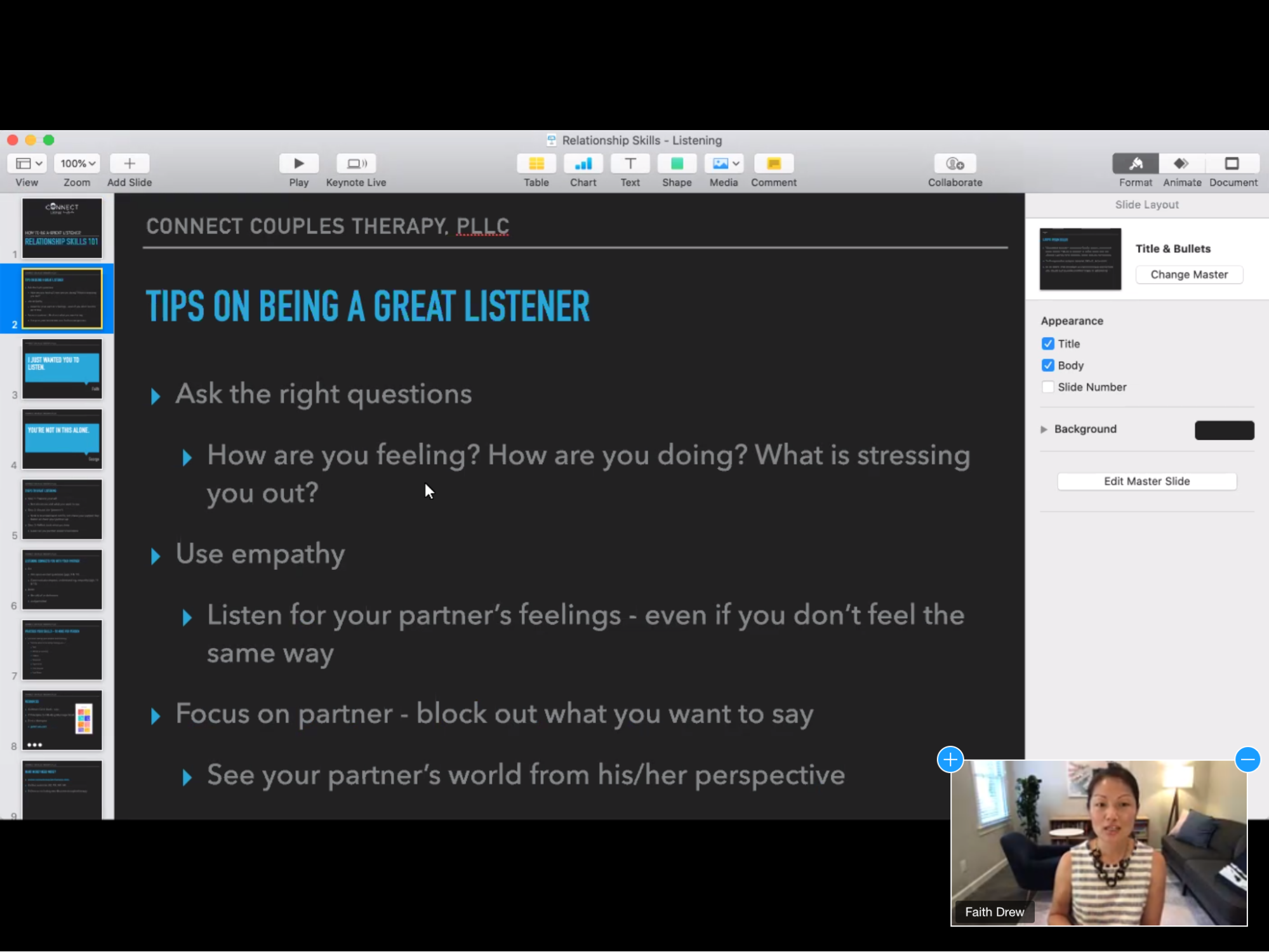
After that, Dr. Drew shared 2 short clips which consisted of conversations between Dr. Drew and her husband/business partner, George as examples.
In the first clip, she expressed her stressful feelings to George as she was having difficulties dealing with their 3-year-old daughter due to COVID-19. She explained to George that she was struggling to explain the ‘new norms’ of COVID-19 to their 3-year-old daughter. However, George kept cutting Dr. Drew off when she was talking and tried to propose a solution before fully listening to her. This action of George had made Dr. Drew frustrated and she tried to defend herself verbally. After the first clip, two participants shared their opinions. The first participant pointed out that it was rude of her husband to pick-point at her mistakes and interrupt her during the conversation. The second participant pointed out that George was not being empathetic towards Dr. Drew and Dr. Drew was getting defensive.

In the second clip, Dr. Drew also expressed her feelings to George as in the previous clip. However, George’s actions were different in this clip. In this clip, George listened attentively to her problems and showed good body language such as patting Dr. Drew’s shoulder and nodding. When Dr. Drew finished talking, he expressed that he understood her feelings. After the second clip, a participant pointed out that there were signs of empathy from George such as affirming Dr. Drew’s feelings and showing physical touch to soothe her.
After both of the clips were played, Dr. Drew explained that when people are in a conversation with their partners, they tend to try to get their partners out of the situation by using distractions or humour. Even though this can be a great strategy, it is not a great first move and it should only be used when the conversation has ended. Thus, she shared that it is better to listen to the partner attentively first before carrying out any further actions. She also explained that physical touch is extremely important in a relationship to provide reassurance to the partner. Lastly, she also emphasized the importance for the partner to understand that the listener is “ALONGSIDE with him/her rather than COMING AT him/her”.
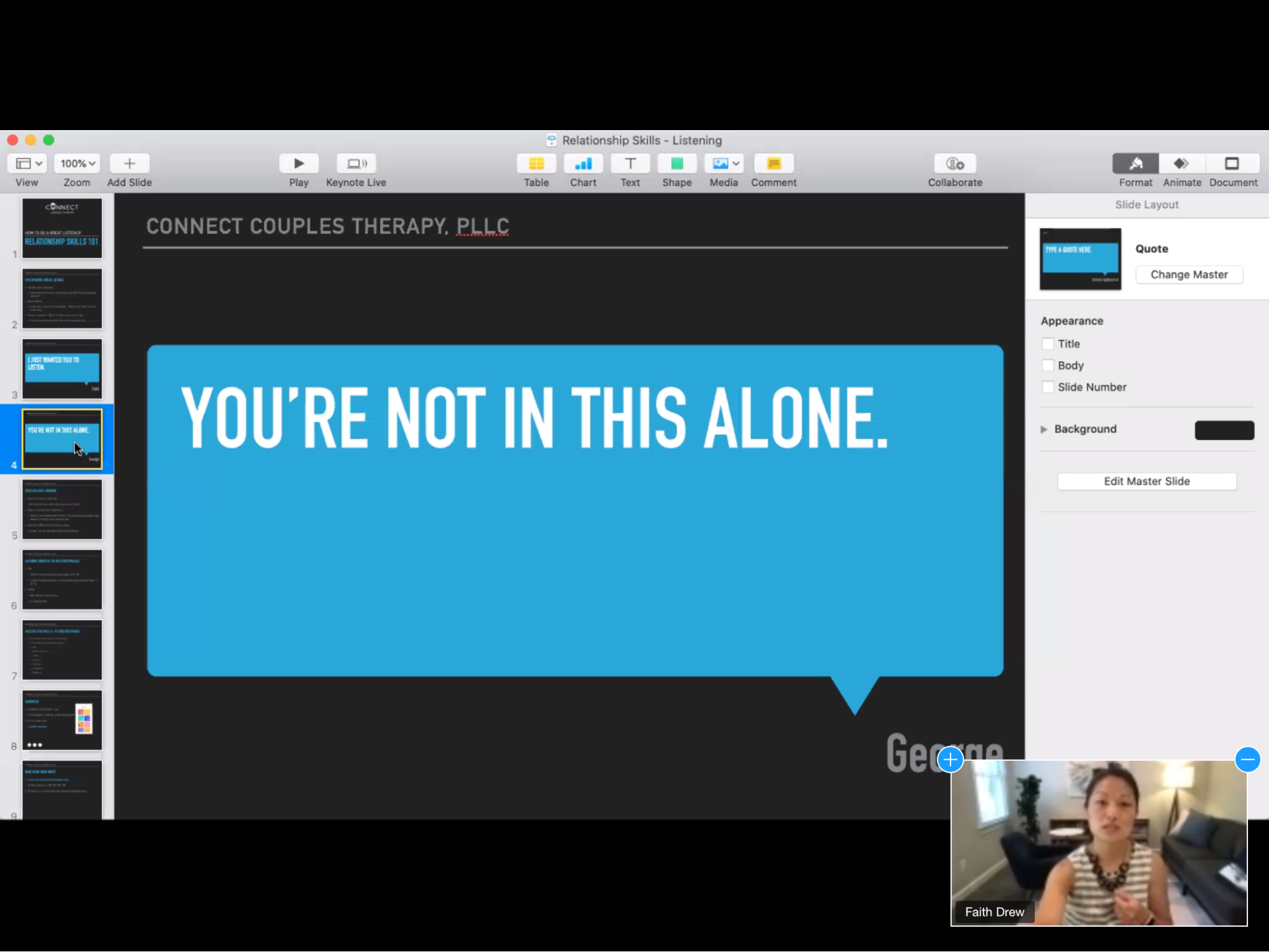
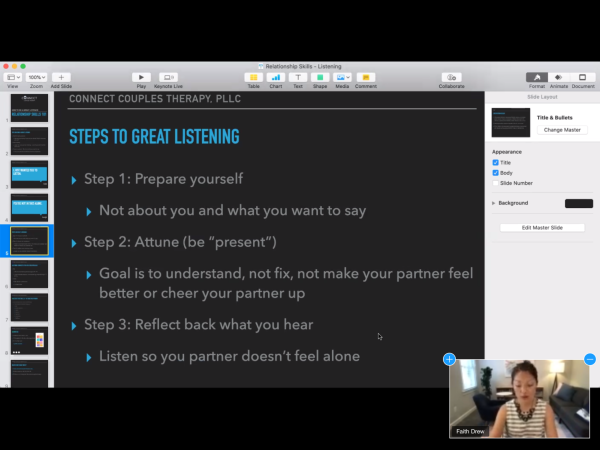
Steps to Great Listening
Dr. Drew then proceeded to list down and elaborate on steps to great listening. Firstly, she mentioned “prepare yourself”. She proceeded to remind the audience to keep in mind that it is not about them or what they have to say at that moment of time. Instead, it is about their partners who are trying to express and communicate their thoughts and feelings. She suggested the audience to schedule a designated time and space frequently and consistently to have an open and honest conversation about whatever was bothering/frustrating them. Secondly, she emphasized on the importance of being “attune” or being present. The goal is to understand the partner, instead of fixing or making them feel better. For many people, when someone is confiding in them, or venting, or expressing frustration, their first instinct is to help them find a solution to ease their pain. Although that is an ideal outcome to achieve, she suggested that problem-solving should only be done after the conversation. She explained that it is a habit of many to attempt to distract their partners from their current state of emotion by trying to “cheer them up”, or changing the subject to lighten the mood. However, Dr. Drew explained that it is important to allow the partner to be present in their emotions during the time when they are confiding in the listener, and it is even more important for the listener to be able to be present with them in that emotion. It creates a deeper connection and understanding between the listener and the partner. She explained that this permits an opportunity for the listener to truly empathize with the partner’s struggles or concerns. Lastly, she requested for the participants to “reflect”. She proceeded to explain that it is best to reflect back on what the partner is trying to communicate, in order to avoid any misunderstandings as well as to reassure the partner that the focus is on them. It can be as simple as repeating or paraphrasing what the partner had just said, to clearly understand the information they are relaying. She also reminded the audience to never assume anything and to always clarify everything they had heard from their partner. Getting offended or defensive during a vulnerable conversation will only make the conversation more difficult for both parties.

Listening Do’s and Don’ts
Dr. Drew then proceeded to describe the Do’s and Don’ts to look out for when practicing effective listening skills. The ‘Do’s’ mentioned were to “ask open-ended questions”, and to “Communicate respect, understanding, and empathy”. A few open-ended and respectful as well as empathetic questions were suggested for the participants to try out. These questions are seen in the picture below.
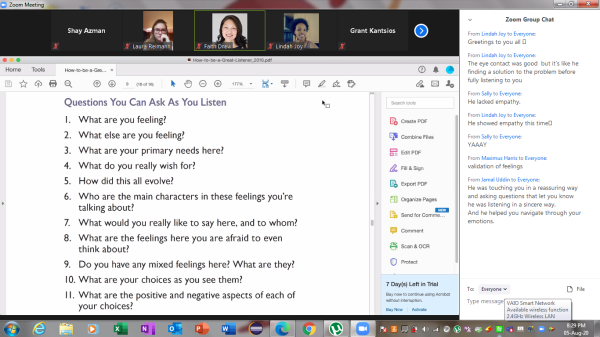
A non-verbal way to convey respect and understanding that was suggested by Dr. Drew was to be mindful of body language. Holding the partner’s hand, facing the partner while they talk, and nodding can all help get the empathy and understanding across.
Listening Don’ts that she mentioned included being judgemental, being critical and defensive by using attacking language such as “you always/ never”, and directing the conversation to the relationship and those in it, rather than to the actual problem/external stress.
Activity to try with a partner!
Dr. Drew later provided a chance for the audience to try the listening activities with their partners. There were 2 rounds for the partners to take turns to be the listener and speaker and each round was 8 minutes long.
Before the activity was carried out, she emphasized on the Do’s and Don’ts of listening and reminded the participants who were trying the activities to avoid attacking languages and avoid being judgemental but ask open-ended questions. She showed a list of phrases and supporting sentences to say when listening, without interrupting the partner, to express empathy respectfully.
Examples of these sentences are shown in the picture below.

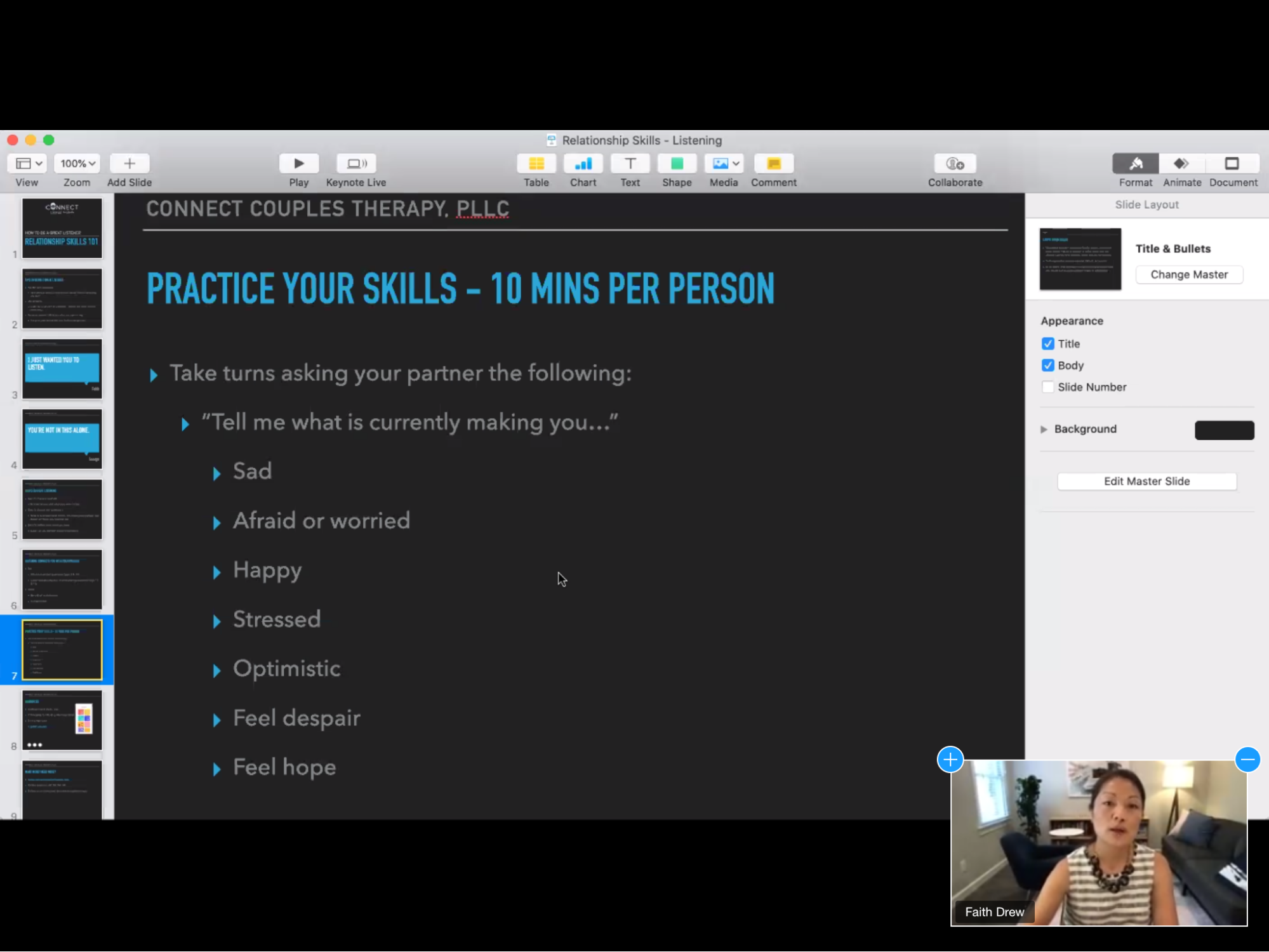
Simple Everyday Practices to help to become a better listener
A few questions for daily practice were also suggested by Dr. Drew to maintain good communication and connection between partners. Simple questions such as, “Tell me what is currently making you sad/ afraid/ worried/ happy/ stressed/ optimistic/ despair/ hopeful” were mentioned.
When the activity was over, Dr. Drew asked the participants for their feedback and thoughts on the activity as well as the outcome. A participant came forward and admitted, “my partner did a good job with empathy”. Dr. Drew explained that it is normal to feel unnatural when practicing these listening activities and many people may argue that relationships should be natural, but this is a learning experience which will not always be natural, especially not during the first session. She also received comments from clients in the past on how difficult it was to not interrupt their partners and offer a solution to their concerns and issues, and how challenging it was to not get distracted by their own thoughts and assumptions. However, she also received comments from clients that they felt relieved and calmed to be able to have a conversation without feeling the pressure of having to offer an immediate solution.
Resources
As the online event was coming to an end, Dr. Drew offered a few resources for the audience. One of the resources was a free app by the name of ‘Gottman Card Deck’, which is essentially an app for couples to use as conversation topics/starters.
Dr. Drew explained the main goal of the app is to help couples practice better listening skills by asking the right questions. As people evolve from time to time, this app can be useful to keep each other updated on their individual self, especially for couples in their long term relationships. Besides this, the app guides couples in maintaining healthy relationships through rekindling the friendship base of the relationship. Interested to check out the app? Please scan the QR codes below.

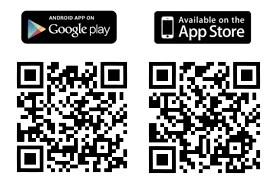
Another resource shared was a book called ‘7 principles for Making Marriage Work’ by John Gottman, as well as a website to seek out for the nearest couple/marriage therapist.
Written by: Cheng Joan and Shay Azman
Edited by: Wu Wen Qi



